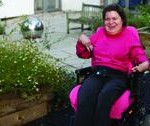
We know that access to accurate information is crucial if people are to make good decisions about the support they get from services. If someone with a learning disability is admitted to a hospital unit for assessment or treatment for a mental health issue or in response to behaviour that is challenging support services, this can be a particularly difficult and confusing time for all concerned.
In her debut blog, Alison Giraud-Saunders, along with co-author Angela Cole, describes a booklet that she co-authored with the involvement of family members which has lots of key information on the law and people’s rights.
[read the full story...]








